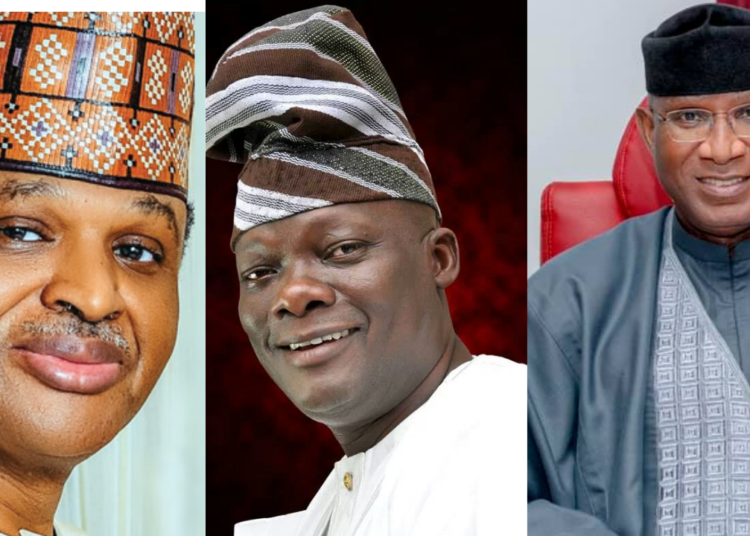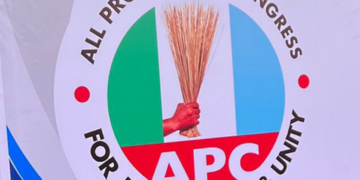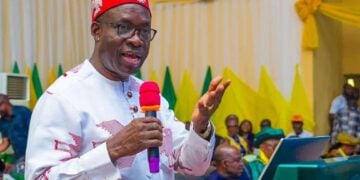Bala Mohammed Defies Opposition ‘Powers’ To Win Re-election
Bauchi State governor, Bala Abdulkadir Mohammed was re-elected for another tenure of four years in the recent governorship election in the state against the wish of aggrieved political kingmakers in the state.
Two Bauchi former governors – Isah Yuguda and Ahmed Adamu Mu’azu; a former speaker of the House of Representatives, Yakubu Dogara; former Wazirin Bauchi, Alh Muhammadu Bello Kirfi and a host of other heavyweight political gladiators collapsed into a single united front to scuttle the re-election bid of the Duguri-born Bala Mohammed.
They supported Bauchi APC governorship candidate, Air Marshal Sadique Baba Abubakar (rtd) who came second at the end of the election with 432,272 votes.
However, following INEC’s declaration that Bala won his re-election without the clear support of those aggrieved Bauchi political heroes who are oftentimes seen to be capable of doing and undoing anything within the political spaces in Bauchi was shocking.
Governor Bala, in a write-up he personally signed and published on Thursday March 23, 2023 titled: “We will Not Be Distracted: Power Belongs to God” maintained that “I can understand the refusal of people who were never schooled in the tenets of democracy refusing to accept that the voters do not follow orders in choosing their leaders. I can sympathise with people whose over-bloated ego precludes them from accepting defeat. I can understand the disappointment of those whose pre-election utterances bothered on playing God but who have now been compelled to swallow the bitter reality that power belongs to God. But I cannot understand desperation and lies.
“We went into the elections without the security paraphernalia boasted or brandished by some of our opponents; we went into the elections without the resources, both internal and external that our opponents mustered, we went into the elections without any godfather, let alone an Armada of ‘kingmakers’ who arrogated to themselves the power to make and unmake leaders. Rather, we went into the elections trusting in Allah, who gives power to whom he chooses and takes it away from whom he chooses. It was in realisation of the omnipotence of Allah that I pledged, on the eve of the election, to accept the outcome of the exercise. Even now, I reiterate that position.”
LEADERSHIP Sunday gathered that the governor’s motivation were the physical infrastructure that his administration delivered to the people of Bauchi State in his first tenure. The projects, cutting across towns and villages, speak volume for the robust political commitment and mindedness Bala has.
A Bauchi-based political analyst, Abdul Yahaya, explained that the projects that incumbent Bauchi State governor was able to provide to the citizens ‘campaigned’ for him.
He said the successes recorded by the PDP during the presidential and national assembly elections placed the party’s governorship candidate on a competitive stage more than any of his opponents.
“The PDP won presidential elections in Bauchi and about eight or seven members of the national assembly out of 11 that Bauchi State has. This is in addition to two senators elected under the party.
“This political setup covering all possible areas and places in Bauchi greatly favours the party,” he said.
He added that given the religious support that the governor enjoyed from both Christians and Muslims, regardless of sect, helps him in securing re-election.
“The governor, mindful of the secular nature of the state, constructed churches and mosques in the same proportion. He sponsored pilgrims from both faiths without prejudice,” he stated.
Makinde Snatched Victory From The Jaws Of Lion
Though the 2023 general election has come and gone and the Oyo State governor, Seyi Makinde returned as the re-elected governor, it is not without the reservation of some people in the state, which primarily bothers on security of lives and property. The operators of his Park Management System (PMS) are in focus and pundits have suggested that he finds a way of injecting sanity in the affairs of the agency in this new and last term in office.
However, against all odds, the incumbent governor of the Peoples Democratic Party (PDP) emerged winner of the gubernatorial election conducted on March 18, 2023.
It was an election where all available permutations prior to the election pointed in the opposite direction of what the outcome was going to be.
The election, aside Makinde winning it, was unique as the gap with which he led the closest rival, Senator Teslim Kolawole Folarin of the All Progressives Congress (APC) was so wide that it turned out to be no contest in the real sense of the word. In fact, in the cycles of elections under the present democratic dispensation, such a gap between the winner and the runner-up had never existed. It was a flat beating.
It would be recalled that at the presidential and national assembly elections held on February 25, exactly three weeks before the election under reference, the PDP, though a ruling party in the state, only struggled to win four of the 14 House of Representatives seats available for the state while the APC won the remaining 10 seats. The three senatorial seats were cleared by the APC in addition to the APC winning the presidential election in the state.
With these results, it was concluded that the ruling party and its gubernatorial candidate, not minding the power of incumbency, would be beaten at the election.
But the bookmakers were wrong after all. The question now is what was the magic wand waved by Makinde to trounce his opponents?
It must first of all be established that the sophistication of the electorate in the state was very much at play as the expected bandwagon effect had no place in the election.
Ordinarily, one would have thought that the people would fall for the notion that since the APC would form the central government, having won the presidential and national assembly elections in the state three weeks earlier, the natural thing was for the state to be won by the APC in order for it to ‘belong’. Such a notion had no bearing with the generality of the people of the state.
The governor, a product of coalition of some political parties in 2019 primarily to wrest power and the state from the grip of the then outgoing governor and a member of the APC, the late Sen Abiola Ajimobi had fallen out with the majority of those who were part of the coalition.
Even his political party, the PDP had an axe to grind with him and to worsen the matter was the governor’s open disagreement with the party’s choice of presidential candidate for the election in person of Alh Atiku Abubakar.
Makinde was one of the five governors from the middle belt and southern parts of the country commonly referred to as ‘G5’ who insisted that the choice of Abubakar was in breach of the party’s principle of rotational presidency between the north and the south and that it would run against the cause of natural justice to keep silent and allow the injustice to stand.
While the face-off between the presidential candidate and the opposing governors lasted, it was reported that the presidential candidate of the APC and now the president-elect, Asiwaju Bola Ahmed Tinubu was in talk with them.
The result of the presidential election proved that in the state and it empowered the traditional members of the PDP in the state to make a resolve to pay Makinde back in his own coins by voting the opposition.
In the meantime, the opposition party candidate, Sen Folarin was formerly of the PDP and to switch allegiance to him by his former friends and PDP members who were aggrieved with Makinde’s style was effortless.
To compound the matter for the governor was the open declaration of support for the opposition by the living ‘Oracle of Oyo politics,’ the former governor of the state and Otun Olubadan of Ibadanland, Sen Rashidi Ladoja.
The former governor was the arrow-head of the coalition that produced Makinde in 2019.
Though the statesman had on several occasions announced his exit from partisan politics, he still commands a cult-like political followership in the state.
It was the supporters which cut across different political parties that fired the first salvo, announcing their allegiance to the opposition before his open endorsement of Folarin of the APC as the anointed gubernatorial candidate for the election. Equally of importance and significance was the Adebayo Adelabu (Penkelemesi) factor. Here is a man who was the APC gubernatorial candidate in 2019 and narrowly lost to Makinde, but was forced to cross to the Accord Party with the denial of the APC gubernatorial ticket won by Folarin. Adelabu did not leave the party just as an individual, he left with his supporters who detest Folarin’s candidacy seen as usurpation.
With the aggrieved members of the APC, who supported and followed him to Accord, he was seen as the albatross of Folarin in the contest up till the time of presidential election and there were insinuations that he would be persuaded to step down for Folarin.
Adelabu did not step down for Folarin or anybody for that matter, but a few days to the March 18 election, his party apparatchiks in the state rebelliously announced their adoption of Makinde as the preferred candidate. He had to run to Abuja for safety and it was from the party headquarters in Abuja that his candidacy and the party’s participation in the election was confirmed.
A caretaker committee was hurriedly put in place to direct the party affairs and midwife the election in the state. But the damage had been done as his (Adelabu) performance in the election was abysmally low and very degrading too or how can one explain a candidate in an election losing his polling booth to the opposition?
How Makinde was able to do it to decimate a very strong contender within days to the election would be a very good study for political scientists in the future.
He was accommodating enough to be one of the early callers to congratulate the governor on his re-election.
Any keen follower of the political development in the state would have seen far ahead the danger of Makinde’s politics, especially to the APC candidate.
With the governor’s membership of the opposition G-5 within the PDP, he’s not seen as opposition by the APC which manifested during the campaign for Asiwaju Bola Tinubu in the state.
As crowded as the APC presidential standard-bearer schedule was on that day, he still found time to visit Makinde in Government House where he was said to have told the governor that he’s doing well. In the relationship between Makinde and the APC, one other factor that must not be glossed over is the antecedents of Folarin. Prior to the APC presidential primary election, Folarin was in the camp of Prof Yemi Osinbajo, the incumbent vice president, whose decision to participate in the primary election was seen as betrayal of Tinubu, regarded as his political mentor.
A school of thought was of the view that if Tinubu had been so committed to Folarin’s cause, Adelabu, who is seen as a Tinubu protege would have been persuaded to drop his ambition for the former Senate leader. So, there was the tendency that not a few members of the APC worked for Makinde as a compensation for Tinubu’s victory in the state.
The governor, whatever may be his shortcomings, bonded very well with the generality of the people of the state by his seemingly populist ideology.
Immediately he was sworn-in in 2019, he announced the abolition of the annual payment of N3,000 education levy by secondary school students in the state which the previous regime put in place for the maintenance of the schools.
A very workers-friendly governor, he also bonded well with the pensioners.
The gang-up against him towards the election elicited sympathy for him among the electorate, some of whom were free-thinkers politically.
In addition to all these, the factor of money was also of high significance as the governor, who has the control of the state treasury, deployed funds adequately for the election and the result justified it.
How Gov Okowa’s Preferred Candidate, Sheriff, Bounced Back
The presidential election where Peter Obi won 18 of the 25 local government areas of the state with a total number of 342,866 votes to defeat the PDP vice presidential candidate, Senator Ifeanyi Okowa actually wrote off what was remaining in PDP in Delta State.
However, with the one week shift for the gubernatorial election, a lot of strategy was put in place and this time around, Okowa, also the speaker’s godfather, was not ready to lose out totally during the governorship election, so he did everything needed to to get victory for Hon Sheriff Oborevwori, the PDP guber candidate, for him to remain relevant politically and his choice eventually becomes the governor-elect of Delta State.
According to the state returning officer, Prof Abraham Georgewill Owunari, Sheriff Oborevwori won by polling 360,234 of the 687,121 total votes cast as against 240,229 secured by his major rival and the deputy Senate president, Ovie Omo Agege of the APC.
It is interesting to note that the governorship candidates of major political parties in the state were chosen from Delta Central, eminently populated by the Urhobos, a factor that truly influenced the election. This is because the PDP has always maintained a rotational method among the three senatorial zones in choosing its candidate since 1999.
After emerging victorious at the Supreme Court as the gubernatorial candidate of the party, other persistent legal battles against Oborevwori’s governorship candidate were described as an exercise in futility by the Federal High Court, sitting in Asaba a few days to the election.
The court in its resounding judgment in suit number FHC/ASB/CS/3/2023, filed by the opposition the APC, Chief Ikie Aghwarianovwe, aspirant against PDP, Oborevwori and the Independent National Electoral Commission (INEC), declared that the plaintiff’s action was statute barred as it obviously violated constitutional provisions requiring action to be filed within 14 days from the date INEC published particulars of candidates in 2018.
Having survived the courts, as part of his campaign strategy, Oborevwori focused on the M.O.R.E agenda. It was so publicised as the most viable and bankable manifesto that genuinely sought to advance the socioeconomic, infrastructure and human capital development of the state and citizens.
In recognition of the important roles of traditional rulers in nation building, he paid a state-wide visit to royal fathers in the state where he pleaded with them to convince his subjects to support his ambition. Most of the monarchs actually keyed into the arrangements where they garnered support for him.
Apart from his clean political and public service records spanning over two decades, his visionary leadership style, unblemished integrity and uncommon humility and as the longest serving speaker since the creation of Delta State, he was able to get support from the electorate.
According to the executive assistant on Communication to Governor Okowa, Barr Latimore Oghenesivbe, “he is a respected political leader, a team player and an honest individual who peacefully and successfully managed the affairs of the Delta State House of Assembly in the past six years and counting, and therefore eminently qualified to govern Delta State as the right successor of the incumbent multiple award-winning governor and PDP vice presidential candidate, Ifeanyi Arthur Okowa.”
On the other hand, the speaker’s campaign team was able to sway the electorate that Senator Ovie Omo-Agege used his privileged position as deputy senate president to ensure the establishment of six federal projects, including the Nigerian Law School in his Urhomorhun village of Orogun town, obviously to the detriment of eight local governments in Delta central senatorial district.
The team also disclosed that two major projects, the Federal Polytechnic and the Nigerian Law School, as well as other projects were deliberately and mischievously smuggled to Orogun community by Senator Agege with nothing for other Ughelli North communities and seven local government areas that voted for him and his party in 2019.











